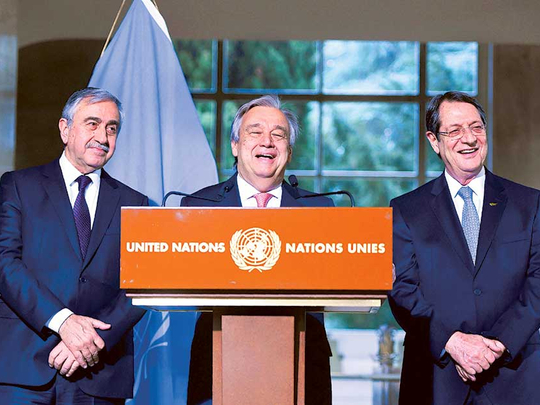
GENEVA: UN chief Antonio Guterres opened a crunch conference on Thursday aimed at ending decades of division in Cyprus, billed as the “very last chance” to solve one of the world’s longest-running political crises.
Guterres was undertaking his first foreign trip as UN chief in a bid to achieve a breakthrough at the Geneva summit that also involves rival Cypriot sides as well as Greece, Turkey and former colonial power Britain.
The eastern Mediterranean island has been divided since 1974, when Turkish troops invaded in response to an Athens-inspired coup seeking union with Greece.
Thursday’s multiparty talks follows three days of negotiation between rival Greek Cypriot and Turkish Cypriot leaders aimed at forging a united, two-zone federation.
The intra-Cypriot talks have focused on thorny domestic issues such as territory and what a future, unified government might look like.
UN Cyprus envoy Espen Barth Eide has called this week “the moment of truth” and insisted that a deal to solve the long-standing division was within reach.
In a crucial step, Greek Cypriot President Nicos Anastasiades and Turkish Cypriot leader Mustafa Akinci late on Wednesday exchanged maps detailing their visions of how internal boundaries should be redrawn.
Turkish Cypriot leaders have agreed in principle to return some of the land they have controlled since the failed 1974 coup.
Greek Cypriot government spokesman Nikos Christodoulides said that the map presented was “within the framework” agreed during previous negotiations that foresees the Turkish Cypriot zone amounting to a maximum of 29.2 per cent of the island.
“We consider it as a particularly positive development,” Christodoulides said while noting that disputes remain and a final map has not been agreed.
Thursday’s conference marks Guterres’s first foreign trip since taking over the UN’s top job on January 1.
British foreign secretary Boris Johnson, Greek foreign minister Nikos Kotzias and Turkish Mevlut Cavusoglu were all on hand representing Cyprus’s so-called “guarantor powers”.
Under a 1959 treaty, those nations were allowed to intervene to defend the island’s sovereign integrity, which Ankara used to justify its invasion.
Any peace deal will likely include significant changes to or even the elimination of the guarantor power arrangement.
Greece has called it out of date and Britain has said it was happy to give it up if Cypriots asked.
Britain also retains military bases in Cyprus that are sovereign British territory.
In a statement before arriving in Geneva, Johnson said Britain was ready to help solve the Cyprus problem “in any way it can”, applauding the “courage and commitment that has been shown by both sides.”
The estimated 30,000 Turkish troops deployed on the island remain a deeply divisive issue, with Anastasiades wanting them to leave the island but Akinci determined to keep a military presence.
Ankara has said little about the type of security deal it would be willing to endorse.
UN peacekeepers also safeguard a buffer zone between the two sides.
While Cyprus has been a European Union member since 2004, Anastasiades’s internationally recognised government exercises no control over the northern Turkish-ruled part of the island, and EU legislation is suspended there until a settlement is reached.
The UN envoy has stressed that the goal of the peace process is to create a unified Cyprus that would be a full EU member.
European Commission president Jean-Claude Juncker, in Geneva as an observer to the conference, said before arriving that the island’s future was hanging in the balance.
“I really think that, without overdramatising what is happening in Geneva, that this is the very last chance to see (a solution for) the island being imposed in a normal way,” he said.












